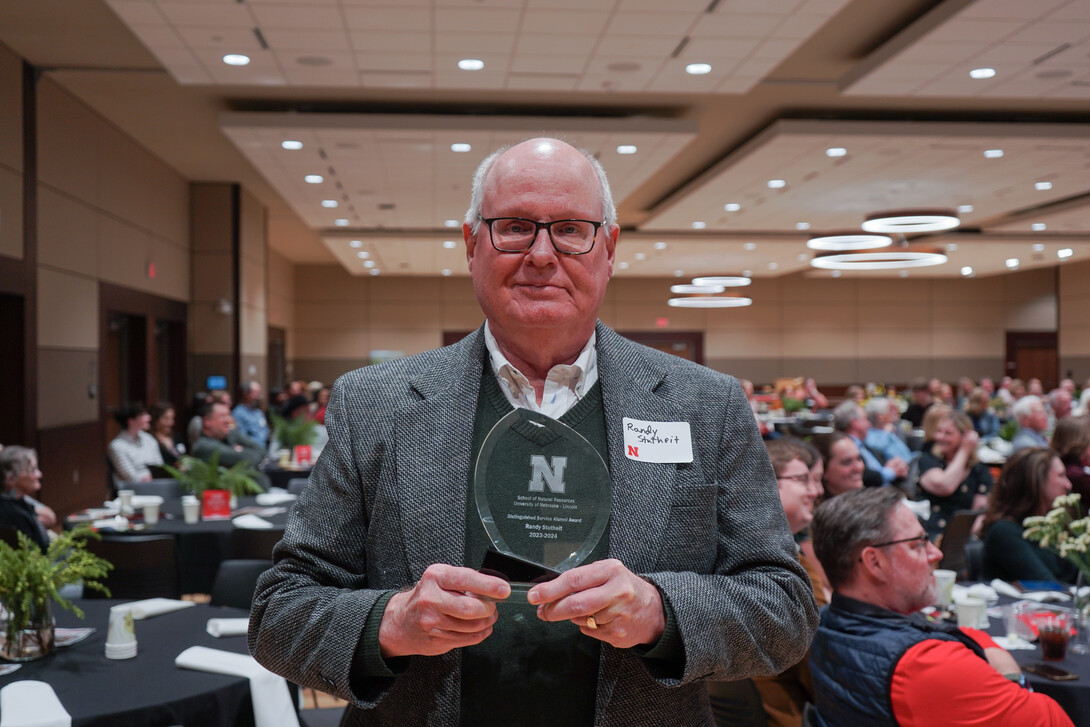
Lincoln, Neb. —Randy Stutheit has a couple of words of advice for students seeking a career in natural resources.
Passion and persistence.
The 2024 winner of the School of Natural Resources’ Distinguished Service Alumni Award said the field was competitive even back in 1979 when he graduated from Nebraska and sought work with Nebraska Game and Parks. Now, for management positions in natural resources, he said many employers expect applicants to have a master’s degree. Still, he encouraged those who have a passion for conservation and the outdoors to persist.
“You really have to maintain your persistence, to continue trying and keep working at getting a job, and then that's where your passion also can shine through,” Stutheit said. “You know, someone would look at you and say, ‘Oh, you've been trying to get a job in the conservation field for five years. Well, you're obviously very serious about it, and you have a passion for that type of work.’ So, that works in your favor. But yeah, persistence and passion are the two probably biggest words that I would hang my hat on.”
Even back in junior high when he hunted rabbits and squirrels on his family’s farm near Cook, Stutheit had been telling people he wanted to work in wildlife management. So, in the first two years after college, when he worked at the Humane Society and then a place making the laminated beams found in churches, he never gave up on his dream.
Still, he knew that working such jobs, he was getting further from the time of earning his degree and had to make a move to get into his field. He applied for a position in operations and construction at the Game and Parks Commission to get his foot in the door.
“I laid out what I thought I had to do,” he said. “First, get on in some capacity with the Game and Parks Commission, get to know people and be available because a lot of the jobs early on were only open to internal candidates, people already working for Game and Parks.”
He took the position in the carpenter shop, improving facilities in state parks. While the state fair was in Lincoln, he worked as the nightwatchman at the Game and Parks exhibit.
“That was an example of where I was trying to show people my willingness to work and, again, the persistence to try and get into the profession,” he said.
His persistence paid off when an entry-level biologist position opened up at the Game and Parks Commission. Stutheit applied for the job and got it.
He never left it.
The position was retitled and his tasks changed over time, but Stutheit stayed with the job until retiring last June.
“I loved my career,” he said. “I was perfectly happy and enjoyed doing what I did, and so, I would say that maybe my career didn't go exactly as I thought it might when I started but it went in a good direction and I still enjoyed doing what I was working on.”
His first years, he spent a lot of time surveying furbearing animals like raccoons and mink. He also helped with deer and pheasant check stations during the hunting seasons.
Later, he oversaw the restoration of about 35 wetlands on the Game and Parks Commission’s wildlife management areas. Rainwater Basin wetlands are extremely important to migratory waterfowl, and he said that of all the work he did, he was proudest of these restorations.
“Through my career, I ended up touching pretty much every one of those wetlands to do restoration or enhancement work,” he said. “I'm pretty proud of that work improving the wetland habitat in those areas.”
He also helped the Game and Parks Commission waterfowl program manager band Canada geese for population monitoring and tracking. He became responsible for checking the work of others recording data from the duck wings and goose tailfeathers submitted by hunters in wildlife surveys after hunting season.
During an outbreak of avian cholera in the Rainwater Basins, he picked up and disposed of carcasses of ducks and geese.
The waterfowl program manager he worked with, Mark Vrtiska, is now a School of Natural Resources professor and the one who nominated Stutheit for the alumni award.
“Randy impacted a lot of wetland habitat in the state and contributed to a lot of other conservation and management efforts,” Vrtiska said. “It wasn’t one particular thing, but a combination of things he did--in his subtle way--that impacted wetlands and waterfowl across Nebraska and the Central Flyway.”
Stutheit said the Distinguished Service Alumni Award was one of the more special awards he received in his career and he was honored to receive it.
He now encourages students who want to enter the field to work hard, get good grades, take internships, volunteer, be willing to put in the hours, persist and be sure of one thing.
“Number one, you have to have a real passion for this type of work,” he said. “If you just look at it as a job where you go work from eight to five and draw a paycheck, you're not going to be very successful. All the people that I know in Game and Parks or in the conservation field have a strong passion for the resource and for conservation. That'll carry you a long way.”







